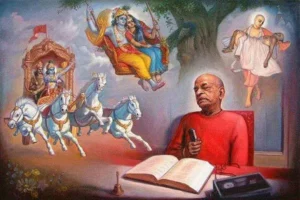

The difference between a conditioned soul and a liberated soul is that the conditioned soul has four kinds of defects. [Isopanishad Introduction]
Defect 1
The first defect is that he must commit mistakes. For example, Mahatma Gandhi was considered a great personality in our country, but he committed many errors. Even at the last stage of his life, his assistant warned, “Mahatma Gandhi, don’t go to the New Delhi meeting. I have some friends, and I have heard there is danger.” But he did not hear. He persisted in going and one of the fellow citizens killed him. Even great personalities like Mahatma Gandhi and President Kennedy?so many of them?make mistakes. To err is human. Making mistakes is a defect of the conditioned soul.
Defect 2
Another defect is to be illusioned. Illusion means to accept something which is not: m?y?. M?y? means “what is not.” Everyone is taking the body as the self. If I ask you what you are, you will say, “I am Mr. John; I am a rich man; I am this; I am that.” All these are bodily
identifications. Identifying with the body is an illusion.
Defect 3
The third defect is the cheating tendency. Everyone tends to cheat others. Although a person is fool number one, he
pretends to be very intelligent. Although he is in illusion and makes mistakes, he will theorize: “I think this is this, this is this.” But he does not even know his position. He writes books of philosophy, although he is defective. That is his disease. That is cheating.
Defect 4
Lastly, our senses are imperfect. We are very proud of our eyes. Often, someone will challenge, “Can you show me God?” But do you have the eyes to see God? You will never know if you haven’t eyes. If immediately the room becomes dark, you cannot even see your
hands. So what power do you have to see? Therefore, we cannot expect knowledge (Veda) with these imperfect senses. Considering all these deficiencies in conditioned life, we cannot give perfect understanding to anyone. Nor are we perfect. Therefore we accept the Vedas
as they are.
Even prominent scholars have no clear thought, clear understanding; still, they write books. Even if we look at Darwin’s theory, he’s proposing, “Perhaps; it may be,” and he’s writing a big book on anthropology. And people are taking knowledge from that book. So if he is not sure, what is the value of that knowledge? However, Andh? yath?ndhair upan?yam?n??: a blind man is leading other blind men. Things are going on like that.
The senses are imperfect. We have got a cheating tendency. Despite having no perfect understanding, we want to distribute knowledge only because we want to become famous in the world and well-known in the community. Actually, our interpretations have no value. So some scholars take advantage of the Bhagavad-g?t? and put their own conclusion. That is not Bhagavad g?t?. That is something else. But because we have got a cheating tendency, we do like that.
However, Vedic knowledge is not like that. There is no cheating. There is no imperfection. There is no illusion. There is no error. That is Vedic knowledge. So then… The author of Vedic knowledge…
Not Lord Brahm?. The author of Vedic knowledge is Krishna. As it is stated in the ?r?mad Bh?gavatam: tene brahma h?d? ?di-kavaye muhyanti yat s?raya?. He imparted the knowledge, Brahma, ?abda-Brahma knowledge, into the heart of Lord Brahm?. So Brahm? is
not self-sufficient.
Factually, we are supposed to get knowledge, Vedic knowledge, from Brahm?, beginning from Brahm?. But actually, it is not the, from Brahm?. Brahm? got the knowledge from Krishna. Tene Brahma. O? namo bhagavate v?sudev?ya.
So actually knowledge is coming from Krishna. So our proposal is, we are receiving knowledge, this Bhagavad-g?t? As It Is, Krishna is directly giving us the knowledge. We cannot interpret Bhagavad-g?t? in our own way. If we want to study Bhagavad-g?t?, then we have to study as it is. Then it is nice.
Conclusion
So let me summarise this with some examples. The conditioned soul has four kinds of defects: